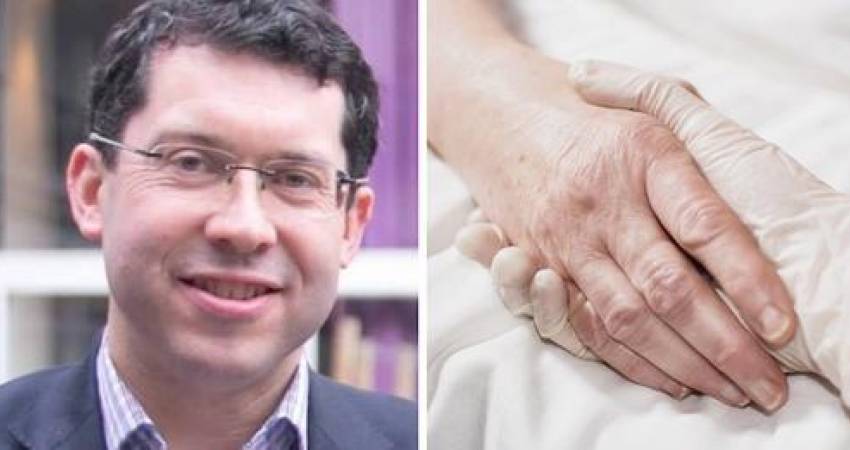
Oireachtas committee will have 'full freedom' to recommend against assisted suicide
Image credit: Rónán Mullen via Twitter / Alberto Biscalchin via Flickr (CC BY-SA 2.0)
Independent Senator Rónán Mullen has welcomed clarification from the Oireachtas Committee on Assisted Dying, of which he is a member, that the Committee has ‘full freedom’ to recommend against the introduction of assisted suicide if it sees fit.
The clarification follows Senator Mullen’s correspondence to Committee Chairperson, Michael Healy-Rae, at the end of March. He pointed out that the Committee’s terms of reference seemed to suggest that it could only make recommendations in favour of introducing euthanasia or assisted suicide.
The Joint Committee on Assisted Dying was formed at the end of January to consider and make recommendations for legislative and policy change relating to a statutory right to assist a person to end his or her life (assisted dying) and a statutory right to receive such assistance.
Last month, the Senator called for a change to the Committee on Assisted Dying’s title and terms of reference in order to avoid “any perception of a predetermined outcome” to the Committee’s work. Speaking in the Seanad, he sought assurance that the Joint Committee can recommend against any legislative and/or policy change in the area.
The terms of reference mandate the Joint Committee “to consider and make recommendations for legislative and/or policy change in relation to a statutory right to assist a person to end their life (assisted dying)”.
“This wording implied that the Joint Committee must consider and make recommendations for legislative and/or policy change,” Senator Mullen wrote in his correspondence to Healy Rae.
“This would appear to preclude the possibility that the Joint Committee could recommend against any legislative and/or policy change in this area,” he said.
Speaking this week, he welcomed an assurance on the scope of the Committee.
In a statement, he said he welcomed clarification from the Committee that “the Committee has full freedom to recommend against the introduction of assisted suicide if it sees fit”.
“However, it is clear from this evening’s meeting of the Committee that the majority of members do not think that we can only go one way on this issue. Nor did people think that it was the intention of the Dáil and Seanad to fetter us in this way or to present us with a pre-ordained direction of travel,” Mr Mullen said on Tuesday evening.
“I welcome the clarification at this evening’s meeting that there is not such a predetermined outcome intended. I look forward now to a careful study by all members of the Committee of the international experience of euthanasia and assisted suicide, the risks which a change in the law would pose to the most vulnerable people in our society, and the wider social consequences of permitting one person to deliberately end, or aid in ending, the life of another,” he said.
Mr Mullen also made clear to the Committee his preference that it use the phrase ‘Assisted Dying / Assisted Suicide’ in reference to its work. He pointed out that this is the approach that has been taken in Britain by the House of Commons Committee on Health and Social Care — which is at present carrying out an enquiry into ‘Assisted dying / assisted suicide’.
The Senator said: “Some say the term ‘assisted suicide’ is judgemental of others but it has to be acknowledged that those who want a change of policy and law are looking to change the law criminalising the assisting of a suicide. Using the term ‘assisted dying’ is frankly euphemistic and masks the fact that serious social change is being proposed,”
“The fairest, and least misleading approach, would be to include both terms, and that is how I intend to refer to the Committee for the duration of its work”.
The Committee held its first meeting, in private session, last week following months of delays. Government TDs participating in the Committee include: Patrick Costello of the Green Party; Alan Farrell and Emer Higgins of Fine Gael; and John Lahart and Robert Troy of Fianna Fáil.
Meanwhile, opposition TDs include: Gino Kenny of People Before Profit; Sorcha Clarke and Pa Daly of Sinn Féin; along with Committee Chair – Independent TD for Kerry Michael Healy-Rae. Rónán Mullen is one of five senators participating in the Committee, along with Independent Lynn Ruane, Labour’s Annie Hoey, Fine Gael’s Mary Seery Kearney, and Fianna Fáil’s Fiona O’Loughlin.
The Committee will commence public deliberations on 13 June, following its first meeting last week after months of delays. The panel will run for 9 months, before producing a report with recommendations in March 2024.
This piece was first published on Gript.
Featured
- Pope Francis on the "grave injustice" of abortion
- Mother sends card on daughter’s birthday to doctors who told her to abort her baby
- Reclaim: Fruitful street session reminds us why we continue fighting for life
- Victory for Life as Maryland Assisted Suicide bill defeated for the 8th time
- Grief more common than relief following abortion, new study finds
- Pro-life group appalled at provision of abortion services in Cavan General Hospital
- Niamh Uí Bhriain opening address: Assisted Suicide Harms Us All
- Assisted Suicide Harms Us All
- Rally for Life 2025
- Don't assist Suicide 2024
You can make a difference.
DONATE TODAY